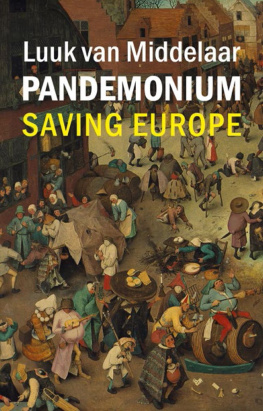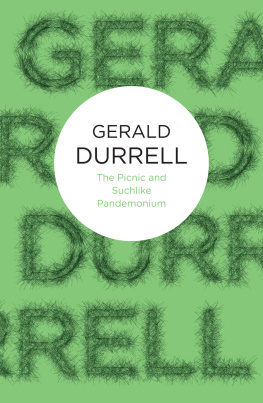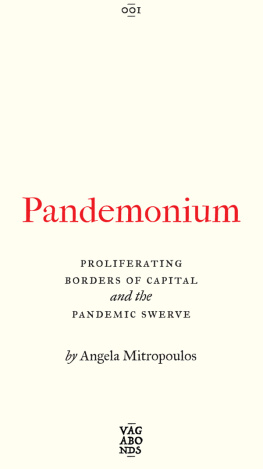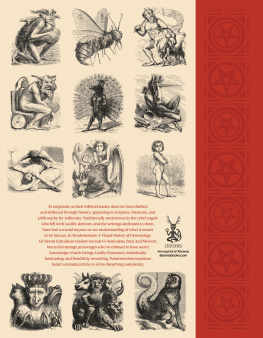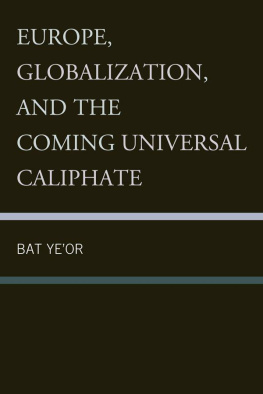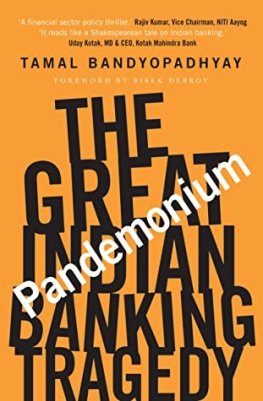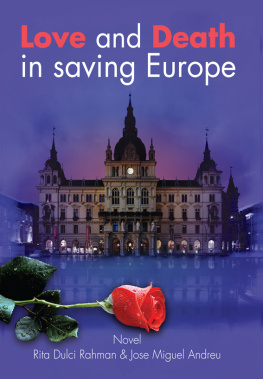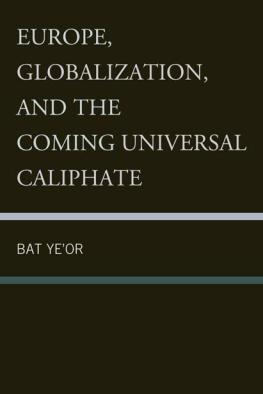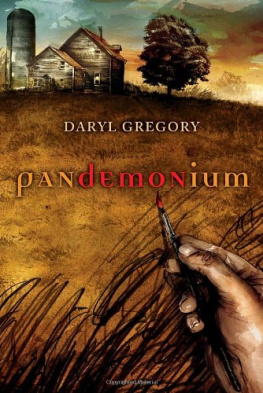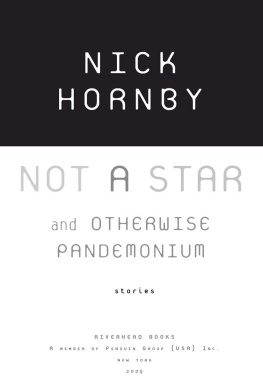Luuk van Middelaar - Pandemonium: Saving Europe
Here you can read online Luuk van Middelaar - Pandemonium: Saving Europe full text of the book (entire story) in english for free. Download pdf and epub, get meaning, cover and reviews about this ebook. year: 2021, publisher: Agenda Publishing, genre: Politics. Description of the work, (preface) as well as reviews are available. Best literature library LitArk.com created for fans of good reading and offers a wide selection of genres:
Romance novel
Science fiction
Adventure
Detective
Science
History
Home and family
Prose
Art
Politics
Computer
Non-fiction
Religion
Business
Children
Humor
Choose a favorite category and find really read worthwhile books. Enjoy immersion in the world of imagination, feel the emotions of the characters or learn something new for yourself, make an fascinating discovery.
- Book:Pandemonium: Saving Europe
- Author:
- Publisher:Agenda Publishing
- Genre:
- Year:2021
- Rating:3 / 5
- Favourites:Add to favourites
- Your mark:
- 60
- 1
- 2
- 3
- 4
- 5
Pandemonium: Saving Europe: summary, description and annotation
We offer to read an annotation, description, summary or preface (depends on what the author of the book "Pandemonium: Saving Europe" wrote himself). If you haven't found the necessary information about the book — write in the comments, we will try to find it.
Pandemonium: Saving Europe — read online for free the complete book (whole text) full work
Below is the text of the book, divided by pages. System saving the place of the last page read, allows you to conveniently read the book "Pandemonium: Saving Europe" online for free, without having to search again every time where you left off. Put a bookmark, and you can go to the page where you finished reading at any time.
Font size:
Interval:
Bookmark:

Also by Luuk van Middelaar and published by Agenda
Alarums and Excursions: Improvising Politics on the European Stage

English translation Agenda Publishing Ltd
Translated by Liz Waters
First published as Een Europees pandemonium. Kwetsbaarheid en politieke kracht by Historische Uitgeverij, Groningen
Luuk van Middelaar 2021
This book is copyright under the Berne Convention.
No reproduction without permission.
All rights reserved.
This publication has been made possible with financial support from the Dutch Foundation for Literature.

Agenda Publishing Ltd
The Core
Bath Lane
Newcastle Helix
Newcastle upon Tyne
NE4 5TF
www.agendapub.com
ISBN 978-1-78821-423-0
British Library Cataloguing-in-Publication Data
A catalogue record for this book is available from the British Library
Typeset by Patty Rennie
Printed and bound in the UK by TJ Books
Contents
This books elucidation of the European response to the coronavirus crisis is based almost entirely on published sources. Nevertheless, it could not have been written but for highly productive exchanges with friends and others backstage in Berlin, Brussels, The Hague, Frankfurt, Paris and Rome. I would like to express my heartfelt thanks to all of them.
A special word of thanks to Hans Kribbe, as well as to Monika Sie Dhian Ho and Frans-Paul van der Putten for the (geo-)political insights derived from our conversations; to my publishers and editors Patrick Everard (Historische Uitgeverij), Heinrich Geiselberger (Suhrkamp Verlag) and Alison Howson (Agenda Publishing) for their stimulation and sharp observations; to translator Liz Waters for her steadfast feeling for language; and to Manon de Boer and Julius for their invigorating company in the year of the pandemic.
LvM
21 May 2021
All were attacked, although all did not die.
Jean de la Fontaine,
The Animals Sick of the Plague
The cry of despair grows louder. In the final winter weeks of 2020, an insidious virus seeds itself across an inattentive continent, pitching tens of thousands into a life-and-death battle. Most European states secure their borders, millions of households lock their front doors, while day after day television news programmes tally the dead and honour doctors and nurses as if they were soldiers going off to war. Military columns bearing Lombardys Covid coffins; abandoned and lifeless Madrid care homes; mobile crematoria in Wuhan: hellish scenes flash by, feeding fears of social contact and infection. In Europe a disaster is unfolding, but there is no joint response. No action.
The loudest cry comes from Italy, hit by the virus early on. Appeals for help go unanswered and bitter reproaches ensue. If in this hour of truth we receive no support, then were better off outside the Union, is the sentiment, echoed, if less shrilly, in Spain. Elsewhere too, the slow, feeble reaction of the European institutions contrasts starkly with the personal tragedies in hospitals and care homes from Bergamo to Madrid, Mulhouse or Tilburg. The hastily closed internal borders are regarded as another scandal. If the Union cannot guarantee freedom of movement, its biggest boast for so many years, if freedom of movement actually becomes a source of danger, then irrelevance and implosion threaten.
It is striking how quickly the concerns and admonitions are transformed into doubts about the survival of the European Union itself. All over the world the unknowns of the coronavirus are demanding the utmost of leaders and populations. The speed of its spread, epidemiological uncertainty and social confusion put all political systems to the test. In China Covid-19 shines a light on the weaknesses and strengths of an authoritarian state. After an embarrassing phase of denial and censorship, Xis government deals resolutely with the calamity. In the United States the pandemic makes a fool of the president, an impulsive leader in a time of crisis, as within sight of an election he zigzags between the obscenity of hundreds of thousands of deaths and the price of a lockdown. Yet no one concludes that either country might fall apart as a result of the virus. For the Union, by contrast, the crisis is instantly, as if automatically, seen as a threat to its very existence.
Amid the pandemic clamour about the approaching end of Europe, two choruses can be heard. First there are the voices of conscience. On Easter Sunday, from a practically empty St Peters Basilica in Rome, Pope Francis addresses the city and the world. Recalling the devastation and reconstruction after 1945, he pleads with his listeners: It is more urgent than ever that rivalries do not regain force, but that all recognize themselves as part of a single family and support one another. Figures of moral and political authority lay the stress on Europe as a spiritual project, on a community of destiny that should transcend national egotism. In the absence of solidarity, Europe as an idea will die.
Then there are the disconcerted voices of finance, sounding from London, New York and Frankfurt. Fearing Europes demise as a currency and a market, they recall the breathtaking financial and economic crises the monetary union passed through from 2008 onwards. Mario Draghi, former president of the European Central Bank, warns of a human tragedy of potentially biblical proportions. It seems the intricate economic fabric woven between the member states that makes the Union so robust is about to unravel.
Outside voices too predict the end of Europe. Not in the tragic language of concern, warning or evocation, but in cutting, mocking, sneering tones, whipped up by Beijing and Moscow: taunts, provocation, even delight. For them the announcement of Europes death is not a tragedy but an opportunity, an event in an epic with a different protagonist. To anyone willing to listen, they gibe that Brussels is suddenly absent and that you would do better to turn to China or Russia for a shipping container of face masks, since times of need tell you who your friends are. The Chinese ambassador in Paris scoffs that the staff of old folks homes have deserted their posts en masse from one day to the next, abandoning residents to hunger, sickness and death. Its enemies smile derisively at European division, at the helplessness of the open society, and brandish the enticements of the strong state, with its unity and discipline.
Amid this anguished tumult, against most expectations and therefore practically unnoticed, the Union, in the midst of the pandemic and very quickly, draws itself up to its full height. A few firm political decisions belie all the fatalism. By Maundy Thursday on 9 April 2020 three days before the papal appeal from St Peters European finance ministers have averted the acute financial threat. On 18 May, three days before Ascension, the German chancellor and the French president reaffirm their desire for a common future in Europe, as Europe. Like true time-artists, they convert the perilous moment into a passage, a transition in time toward a new chosen future.
But what remains, above all in Italy, is the memory of failure at a moment of truth. It creates doubt about Europes capacity to survive the pandemic shocks and economic turbulence as a unity, all the more so since no one has forgotten how the Union fell short on several occasions during the past decade. Time and again, Europes end was announced, although it never arrived. How should we interpret this uncertainty and vulnerability? Is there no self-assurance to be derived from the experience of earlier crises? Does Europe not prove itself able each time to hold crises in check, demonstrating unexpected resilience?
Font size:
Interval:
Bookmark:
Similar books «Pandemonium: Saving Europe»
Look at similar books to Pandemonium: Saving Europe. We have selected literature similar in name and meaning in the hope of providing readers with more options to find new, interesting, not yet read works.
Discussion, reviews of the book Pandemonium: Saving Europe and just readers' own opinions. Leave your comments, write what you think about the work, its meaning or the main characters. Specify what exactly you liked and what you didn't like, and why you think so.

